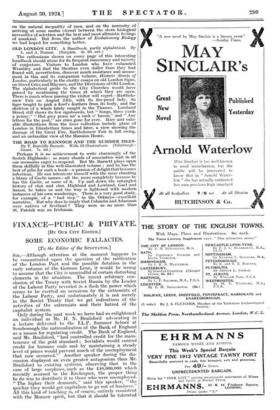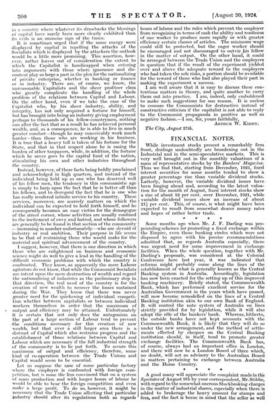FINANCE—PUBLIC & PRIVATE.
[BY OUR CITY EDITOR.]
SOME ECONOMIC FALLACIES.
[To the Editor of the SPECTATOR.] SIR,—Although attention at the moment happens to be concentrated upon the question of the ratification of the London Pact and the possible flotation in the early autumn of the German Loan, it would be wrong to assume that the City is unmindful of certain disturbing elements in the situation. The recent arbitrary con- clusion of the Treaty with Soviet Russia by the Leader of the Labour Party revealed in a flash the power which seems to be exerted on occasions by the extremists of • the Labour Party, and unfortunately it is not merely in the Soviet Treaty that we get indications of the activities of the extremists and their hatred of the • capitalist system. Only during the past week we have had so enlightened an individual as Mr. H. N. Brailsford advocating in a lecture delivered to the I.L.P. Summer School at Scarborough the nationalization of the Bank of England • as a means for regulating credit. The Bank of England, said Mr. Brailsford, "had controlled credit for the main- tenance of the gold standard ; Socialists would control credit for humane ends and by maintaining a steady level of prices would prevent much of the unemployment that now occurred." Another speaker during the dis- cussion displayed an even greater antagonism than Mr. Brailsford to existing systems, observing that in the case of large surpluses, such as the £40,000,000 which „recently accrued to the Exchequer, the proper thing to do was to distribute it to those who were unemployed. "The higher their demands," said this speaker, "the quicker they would get capitalism to go out of business." All this kind of teaching is, of course, entirely consistent with the Moscow spirit, but that it should be tolerated in a country where whatever its drawbacks the blessings of capital have surely been more clearly exhibited than its evils is an ominous sign of the times. It is sometimes urged that if the same energy were displayed by capital in repelling the attacks of the Socialists which is displayed by the attackers the outlook would be a little more promising. This assertion, how- ever, rather leaves out of consideration the extent to which the Capitalist is handicapped when entering into arguments with those where ignorance and dis- content play so large a part in the plea for the nationalizing of private enterprise, whether in banking or finance or in industry. There are, of course, we know, the unreasonable Capitalists and the sheer profiteer class who greatly complicate the handling of the whole problem of the relations between Capital and Labour. On the other hand, even if we take the case of the Capitalist who, by his sheer industry, ability, and integrity, has not only acquired a fortune for himself, but has brought into being an industry giving employment perhaps to thousands of his fellow-countrymen, nothing can alter the fact that as a result he has achieved personal wealth, and, as a consequence, he is able to live in much greater comfort—though he may conceivably work much harder—than those who are working in his business. It is true that a heavy toll is taken of his fortune for the State, and that in that respect alone he is easing the burden of other taxpayers, while, in addition, the fortune which he saves goes to the capital fund of the nation, stimulating his own and other industries throughout the country. Instead, however, of these facts being boldly proclaimed and acknowledged in high quarters, and instead of the individual being held up as one who has deserved well of his fellow men, the tendency in this communistic age is simply to harp upon the fact that he is better off than his fellows, and to disregard the fact that he is one who has really rendered infinite service to his country. These services, moreover, are scarcely matters on which the individual can be expected to hold forth himself, and he consequently becomes an easy victim for the demagogue of the street corner, whose activities are usually confined to the incitement of envy and hatred, and whose followers are generally to be found in that section of the community —increasing in number unfortunately—who are ,devoid of industry or real ambition. Their purpose in life seems to be that of restraining those who would make for the material and spiritual advancement of the country. I suggest, however, that there is one direction in which those who are enlightened on business and economic science might do well to give a lead in the handling of the --difficult economic problems with which the country is confronted. They know, as apparently the mere Labour agitators do not know, that while the Communist Socialists are intent upon the mere destruction of wealth and regard the nationalizing of industries as the preliminary step in that direction, the real need of the country is for the ' creation of new wealth to recover the losses sustained during the War. They know that there was never greater need for the quickening of individual competi- tion whether between capitalists or between individual workers themselves in order that the maximum of output and efficiency may be attained. Unfortunately it is certain that not only does the antagonism on the part of a large section of Labour tend to prevent -the conditions necessary - for this creation of new wealth, but that over a still larger area there is a distrust of Capital which also restrains progress and the establishment of those relations between Capital and Labour which are necessary if the full industrial strength of the community is to be put forth. To secure this maximum of output and efficiency, therefore, some kind of co-operation between the Trade Unions and Capital would seem to be essential.
Let us suppose the caSe of some particular factory where the employer is Confronted with foreign com- petition, but is none the less convinced that on a system of- mass production and with longer hours of labour he would be able to bear the foreign competition and even make a large profit. To do so, however, it might be necessary that the Trade Union affecting that particular Industry should alter its regulations both as regards hours of labour and the rules which prevent the employer from recognizing in terms of cash the ability and readinesS of one worker to produce more rapidly or with greater efficiency certain classes of articles. The minimum -wage could still be protected, but the eager worker should be encouraged and not discouraged to outvie. jiis fellow in the matter of output. On the other hand, it could be arranged between the Trade Union and the employers in question that if the result of the experiment yielded over and above the adequate reward to the employers who had taken the sole risks, a portion should be available for the reward of those who had also played their part in making the experiment a success. I am well aware that it is easy to discuss these con-. tentious matters in theory, and quite another to carry' them out into practice. I am, indeed, only emboldened to make such suggestions for one reason. It is useless to censure the Communists for destructive instead of constructive criticism if the capitalist is not able to reply to the Communist propaganda in positive as well as negative fashion.—I am, Sir, yours faithfully,



































 Previous page
Previous page